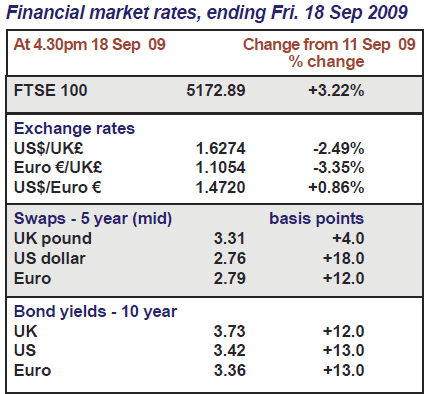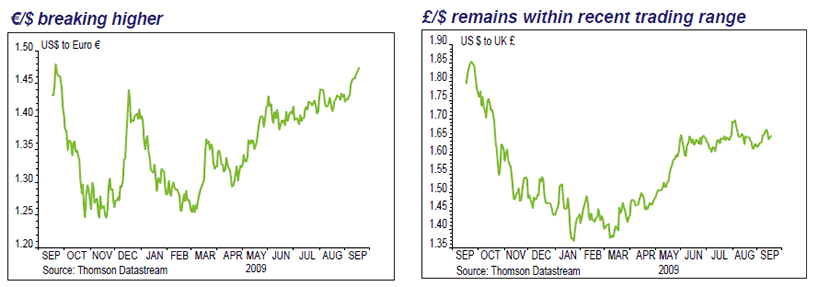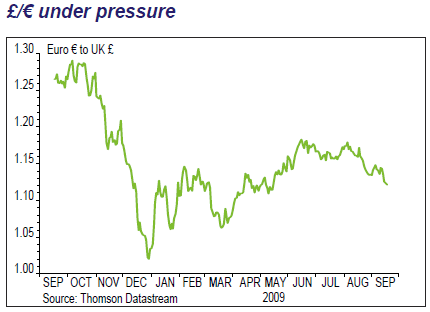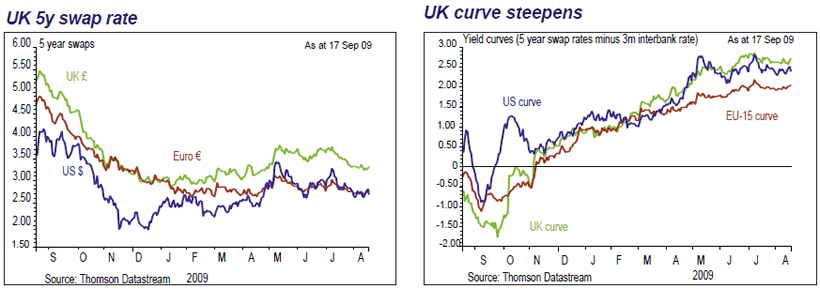Mervyn King’s Comments Hit Sterling While Stocks Continue to Rise
Economics / UK Economy Sep 18, 2009 - 02:06 PM GMTBy: Lloyds_TSB
 Sterling faced considerable selling pressure this week following Bank of England Governor Mervyn King’s Treasury testimony on Tuesday. The Governor commented that the BoE were “looking at” possibly lowering the deposit rates paid to commercial banks on reserves although not mentioning negative interest rates. The resulting decline in yields at the short-end of the curve weighed on sterling and in particular EUR/GBP which closed the week at 0.9045 having broken through 0.90 for the first time since 14th May. All the G-10 currencies posted gains versus sterling.
Sterling faced considerable selling pressure this week following Bank of England Governor Mervyn King’s Treasury testimony on Tuesday. The Governor commented that the BoE were “looking at” possibly lowering the deposit rates paid to commercial banks on reserves although not mentioning negative interest rates. The resulting decline in yields at the short-end of the curve weighed on sterling and in particular EUR/GBP which closed the week at 0.9045 having broken through 0.90 for the first time since 14th May. All the G-10 currencies posted gains versus sterling.
 Against the US dollar, sterling posted the worst performance – falling 2.3%. Despite the weakness, GBP/ USD remains well within its recent trading range (1.5803 to 1.7043) albeit towards the lower end. The dollar index fell to a new low for the year - although recovered somewhat towards the end of the week - to close 0.23% lower as the equity market rally exerted downward pressure.
Against the US dollar, sterling posted the worst performance – falling 2.3%. Despite the weakness, GBP/ USD remains well within its recent trading range (1.5803 to 1.7043) albeit towards the lower end. The dollar index fell to a new low for the year - although recovered somewhat towards the end of the week - to close 0.23% lower as the equity market rally exerted downward pressure.
The Scandinavian currencies were the star performers this week with SEK and NOK the top two gainers versus the dollar, buoyed by the continued rally in commodity markets. The performance of SEK has been particularly interesting given that Swedbank have already gone down the route of negative interest rates. Norway, conversely, is widely expected to be one of the first in the G-10 space to begin tightening monetary policy.
In emerging markets, there was outperformance from the Czech koruna, Polish zloty and the Hungarian forint versus the euro and the US dollar. There was a boost from a further rise in both the current situation and economic sentiment components of the German ZEW. The South African rand underperformed this week versus the dollar, depreciating by 0.1%. The weakness in Chinese equities is likely to have had a negative impact given the commodity links between S. Africa and China.
There was a slew of economic data in the UK this week Despite a slowdown in annual CPI inflation to 1.6% in August from 1.8%, inflation has failed to slow as fast as expected. The rally in sterling following the release was short-lived, however, as Mervyn King’s testimony to the Treasury overshadowed the inflation numbers and set the tone for the week. The cautious outlook by the Bank added to the downside pressure on the short-end and sterling. Labour market data and retail sales both surprised to the downside.
The claimant count rose to the highest level since 1995. Retail sales were flat in August, taking the annual rate to 2.1% from 2.9% and highlighting the concerns expressed earlier in the week by Mervyn King that UK households are likely to continue to feel the effects of the downturn even after economic growth resumes. After reaching the high of the week of 1.6658 following the CPI data, GBP/USD sold off steadily thereafter to close at 1.6274. EURGBP closed the week above 0.90.
The overall tone of the data in the US this week suggests the US economy continues to improve. Retail sales posted an above consensus rise of 2.7% in August, boosted by the “cash for clunkers” programme. Stripping out gasoline store sales and autos, sales were up 0.6%. Improvements in the Empire and Philly Fed surveys in September as well as gains in housing starts in August were also positive. This was evident in equity markets, which continued to push higher, resulting in dollar weakness. EUR/ USD edged to a new high for the year (1.4767) before coming off a touch to close at 1.4720.

Interest rate market review - bonds, cash and swaps
Government bond yields bounced off the summer lows this week as participants reacted to stronger US economic data and investors moved into equities and corporate bonds. Profit taking was also attributed to speculation of a more hawkish Fed FOMC statement next week after chairman Bernanke said it is ‘very likely’ that the recession has ended. UK 5y swap rates fell below 3.20% but reversed late in the week to close above 3.30%.
 Speculation that the BoE could charge negative interest rates on bank reserves caused a plunge in 2y gilt yields to 0.74% and led to a widening of the 2/10y gilt spread to a record 290bps although the Governor only mentioned lowering the rate paid. UK 3-month libor fell below 0.60% and now trades just 9bps above Bank rate. Irish bank credit spreads fell sharply after the Irish government took over €40bn of bad loans of AIB and Bank of Ireland.
Speculation that the BoE could charge negative interest rates on bank reserves caused a plunge in 2y gilt yields to 0.74% and led to a widening of the 2/10y gilt spread to a record 290bps although the Governor only mentioned lowering the rate paid. UK 3-month libor fell below 0.60% and now trades just 9bps above Bank rate. Irish bank credit spreads fell sharply after the Irish government took over €40bn of bad loans of AIB and Bank of Ireland.
BoE governor King and other MPC members uttered dovish comments on the UK economy to the Treasury Select Committee on Tuesday. This helped to suppress gilt yields and pushed the 2y to a cycle low of 0.74%. Governor King reiterated that the outlook for the economy remains murky. The governor also said that considerations were ‘ongoing’ with regard to penalising commercial bank reserves held with the Bank. Interest rate futures rallied sharply, led by the front-end of the sterling strip. Benign July wage data and weaker than expected August retail sales data underpinned the drop in yields. Average earnings growth including bonuses slowed to 1.7% in July, a three-month low. Retail sales were flat m/m in August and were revised lower for July to +0.2%.
Prices fell and yields rose late in the week as US economic data boosted optimism that the recovery is on track. This sparked profit taking in bonds as participants increased their exposure to equities and other risk assets. The Itraxx crossover index fell to 81.0, a 15-month low. The decline in swap rates brought strong corporate issuance especially in the US but also in the UK where Bank of America priced a 30y issue at 220bps over gilts. Motability issued £500mn of 7- year bonds at 230bps over. Separately, the DMO 2.25%, 2014 gilt auction was covered 1.84 times. 5y swaps finished the week 7bps higher at 3.32%.
US Treasury yields returned to the upper end of the trading range at around 3.50% on strong economic data and the rally in the S&P-500 above 1,050. However, yields reversed late on Thursday and closed the week at 3.45%. Data for August surprised to the upside and buttressed confidence that GDP will be positive in Q3. Figures for industrial production and retail sales (including ex-autos) posted above average gains of 0.8% and 1.1% m/m, respectively.
Weekly claims fell below 550k to a twomonth low and housing starts and building permits buoyed confidence that construction has bottomed. Finally, core CPI fell to 1.4% in August from 1.5% in July. A fall in 10y yields back to 3.40% by the end of the week helped the 2y/10y curve to flatten to 244bps. 5y swaps closed the week 11bps higher at 2.77%. Freddie Mac, Fannie Mae, NAB, Morgan Stanley, GE and the Republic of Austria were among the principal issuers of new corporate dollar bonds. Germany is said to be examining a second sale of dollar denominated paper.
Euro zone bunds underperformed gilts and Treasuries, with the rise in yields led by the long end of the curve. The German ZEW survey rose by less than forecast in September to 57.7 from 56.1 in August. Germany, France and Spain all issued paper this week. 5y swaps rose13bps to 2.80%. GE, RATP and Westpac were among the main issuers of euro corporate paper.

Kenneth Broux, Economist
Altaz Dagha, Economist
For more information: Emile Abu-Shakra Manager, Media Relations Lloyds TSB Group Media Relations Tel 020 7356 1878 http://www.lloydstsbcorporatemarkets.com/
Lloyds TSB Archive |
© 2005-2022 http://www.MarketOracle.co.uk - The Market Oracle is a FREE Daily Financial Markets Analysis & Forecasting online publication.



